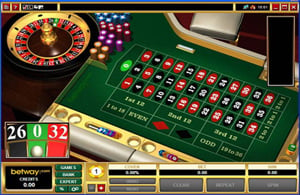If you’re into understanding gambling strategies and improving your odds of winning in your favourite skill based casino game then you need an understanding of gambling mathematics.
No lesson on gambling maths is complete without a knowledge of Expected Value (or EV), which in this field relates to how well a particular player can expect to do in a casino game when placing a series of fixed wagers. An example of this would be to continually bet £10 on black in a game of online roulette.
Calculating Expected Value
The calculation used in Expected Value is as follows:
[(probability of winning) x (amount won per wager) + (probability of losing) x (amount lost per wager)]
To explain this by way of an example, if you play roulette and want to calculate the Expected Value (EV) of a specific wager over a period of time will be, for example if you bet £10 on black. The probability of winning your wager is 18 in 38 and losing 20 in 38 (you can find these probabilities online). The amount that you can win or lose is £10.
If we use these figures in the equation, this will be calculated as follows:
(18/38) x 10 + (20/38) x (-10) = -0.526
What this means is that if you continually wager £10, you can theoretically expect to lose £0.53 (0.526 rounded up) each time you wager £10. This loss can be attributed to the house advantage which all casino games carry resulting in a profit for the casino over the long term.
Expected Value and Probability
In order to work out the Expected Value on a series of the identical wagers you will also need to understand Probability Theory because as you’ve seen from the above equation, probabilities are an important part of the calculation.
Probabilities are often expressed as odds for example one in 5, or as a fraction, percentage or decimal. The latter is the most common and easiest to work with when it comes to gambling mathematics.
In order to work out the probability of something, all you have to do is divide the possibility of an event occurring by the total number of possible outcomes for the scenario. So for example, if we divide 18/30, the probability of the roulette ball landing on red on any spin is 0.474 or 47 percent.
